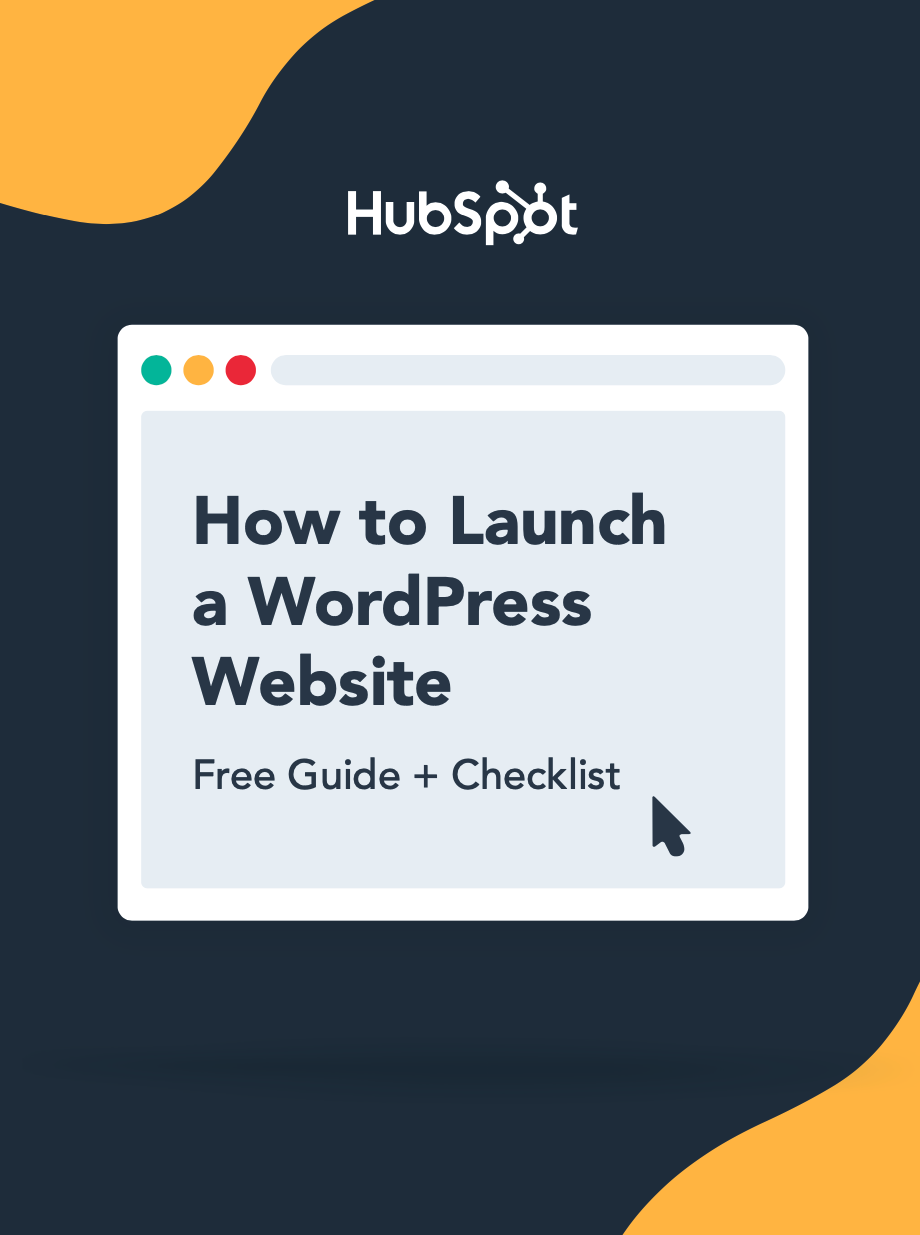What is WordPress? This is a question I first asked myself back in 2008, and it‘s a question that I’m excited to answer for you today.
The non-jargony answer is that WordPress is the most popular way to build a website. Even beginners without technical knowledge can use the WordPress software to build literally any type of website, from blogs to e-commerce stores, online courses, portfolios, and more.
The slightly more jargony answer is that WordPress is an open-source content management system that you can easily extend with themes (for design) and plugins (for adding functionality).
In this beginner‘s guide, I’ll take a closer look at what WordPress is, how it works, and how you can use it to build your own website or blog.
Table of Contents
- What is WordPress?
- What is WordPress used for?
- What websites can WordPress make?
- Why Use WordPress?
- When did WordPress start?

How to Launch a WordPress Website
Learn how to launch a website on WordPress with this step-by-step guide and checklist. Learn how to...
- Set up your domain name.
- Install an SSL certificate.
- Analyze your content.
- Back up your site.
Download Free
All fields are required.

What is WordPress?
WordPress is an open-source content management system (CMS) that‘s available for free. It lets you create your own website without ever needing to look at code. You can use WordPress’s simple dashboard to manage your site and extend your site using themes and plugins.
WordPress is also, by far, the most popular way to make a website. According to the 2025 data from W3Techs, the WordPress software powers over 43% of all websites on the internet. Yes — a little under half of all the websites out there use the WordPress software.
Because of this popularity, I can guarantee that you've visited a lot of websites that use WordPress, though you might not have known it when you were browsing them.
![]()
The open-source WordPress software is a self-hosted website-building solution. Essentially, this means that you can create your website by purchasing your own web hosting and installing the WordPress software there.
This is in contrast to hosted website builders like Wix and HubSpot's free website builder, where the service handles hosting the software for you. All you have to do to get started is register for an account.
While “installing software on web hosting” might sound like something only developers can do, it‘s really not as intimidating as it sounds. Usually, it’s just a matter of clicking a few buttons, and you don't need any special technical knowledge to do it.
For example, at the web hosting service that I use for my own personal WordPress sites, installing the WordPress software and creating a website is as simple as filling out this form.

What is WordPress used for?
When WordPress was first launched back in 2003, it started as a blogging tool. However, WordPress has long since developed into a fully functioning website builder tool that you can use for literally any type of website.
I've seen WordPress used for large e-commerce stores doing millions in revenue, successful online courses, active membership communities, all kinds of portfolio and brochure websites, and lots more. Plus, it's still one of the most popular tools for blogging, used by some absolutely massive publications.
What websites can WordPress make?
I gave you some examples in the previous section, but now I want to actually take a deeper look at what types of websites you can build with WordPress.
Blogs
As I mentioned earlier, WordPress initially started as a blogging tool.
While it has expanded beyond that, it's still one of the most popular ways to make a blog. In fact, I can pretty much guarantee that many of your favorite blogs probably use WordPress. If you want to check, you can use a browser extension like Wappalyzer or enter the website's URL in the IsItWP website.
Many people use it for dedicated blog websites. However, WordPress also makes it easy to add a blog to any other type of website, including all of the website types that I'll cover below.
To help you blog, WordPress includes a dedicated blog post feature, an easy-to-use editor, categories and tags for organization, and a built-in user commenting system.
Professional Portfolios
WordPress is also an excellent solution for professional portfolios. It can work great for photographers, writers, graphic artists, web designers, SEO experts, and anyone else who needs to showcase their work in a portfolio.
I've also seen WordPress effectively used as a sort of online CV/resume website, especially for more technical roles such as web developers, product managers, project managers, and more.
You can choose from the many WordPress portfolio themes to get started with a great design. If you want some extra flexibility for showcasing your work beyond the default WordPress post and page system, you can also consider installing a dedicated portfolio plugin.
Business Websites
In addition to personal portfolios, WordPress also works great for all kinds of business websites. I call these "brochure websites,” but WordPress can also handle more complex business websites if needed.
I've found WordPress to be incredibly popular with all different kinds of businesses, including restaurants and cafes, law firms, medical professionals, plumbers, construction companies, and lots, lots more.
You can find pre-made WordPress themes or starter sites for pretty much any type of business. Or, you can use page builder plugins like Elementor or Divi to access drag-and-drop design.
You can also find WordPress plugins for pretty much any business use case. For example, you can create lead generation forms with the HubSpot WordPress plugin, rank your site in Google using an SEO plugin, and access tons of other helpful features to improve your business's online presence.
E-Commerce Stores
WordPress is also one of the most popular tools for creating an e-commerce store. According to BuiltWith's 2025 data, it‘s the second most popular e-commerce platform, powering around 13% of all the stores in BuiltWith’s sample of the top one million websites.
To use WordPress as an e-commerce store, you'll need to install an e-commerce plugin. WooCommerce is by far the most popular option, but you can also find other e-commerce plugins for various use cases.
If you want to see it in action, check out some real examples of e-commerce stores using WordPress.

Online Courses
Online courses have absolutely exploded in popularity lately, and, in my opinion, they're one of the best ways to monetize your audience if you want to make money online.
While some creators use SaaS course builders like Teachable, WordPress is also one of the most popular ways to make an online course. You can use it to deliver all types of course content, including text, videos, and even one-on-one coaching.
To set up your course, you can use a WordPress LMS plugin. You can also find a number of dedicated WordPress themes for online courses.
Membership Sites
In addition to online courses, WordPress is also just generally a great solution for any type of membership website.
A membership website is essentially a type of site where users can register for a free and/or paid account in order to access some type of restricted content. This restricted content could be special blog posts, online courses, products, discussion forums, podcast episodes, or anything else.
There are tons of flexible WordPress membership plugins that let you add key membership features, including the following:
- Manage user registrations.
- Assign specific roles to users.
- Restrict access to content based on users' roles.
- Accept payment in exchange for membership.
- “Drip” content out over time to keep members engaged.
- Create a frontend members-only area for members to manage their subscriptions.
If you're interested, we have a guide on how to create a membership website with WordPress.
Podcast Websites
In my experience, podcasts are another type of online content that‘s absolutely exploded in popularity lately. If you want to own your podcast’s online platform, WordPress makes a great solution for a podcast website.
You can find a number of dedicated podcast plugins that give you two options for managing your podcast:
- You can use your WordPress website to host your podcast files. While this can work for small podcasts, I don't recommend it for podcasts receiving tons of downloads.
- You can integrate WordPress with your podcast hosting service. When you add a new episode to your podcast hosting service, your WordPress site will automatically create a new entry for that episode, including an embedded podcast player.
To see some of your options, check out our collection of the best podcasting plugins for WordPress.
… Pretty Much Anything Else
I want to make it absolutely clear that the website types above are not the only types of websites you can build with WordPress. I've just found these to be the most common types of websites based on my experience using WordPress.
However, because of WordPress's flexible plugin system (and the 59,000+ free plugins that are available), you can easily build other types of websites if needed.
For example, while less common, I've also seen WordPress used for forums, social networks, mobile apps, and more.
While I might be a little biased because of how much time I've spent working with WordPress, I really do think the sky is the limit with what you can build with it.

How to Launch a WordPress Website
Learn how to launch a website on WordPress with this step-by-step guide and checklist. Learn how to...
- Set up your domain name.
- Install an SSL certificate.
- Analyze your content.
- Back up your site.
Download Free
All fields are required.

Why use WordPress?
Above, I told you that over 43% of all websites on the internet are using WordPress. So, why is WordPress so popular and, more importantly, why should you use WordPress?
Based on my experience building a lot of different websites with WordPress, here are some of the biggest reasons I think you should consider it for your website.
1. WordPress can build anything.
One of the best things about WordPress is that you can use it to build any type of website, from blogs to e-commerce stores, portfolios, online courses, and lots, lots more.
Even if your initial plans are to keep things simple, I think having access to this flexibility can be really useful.
For example, maybe your initial plan is to just create a blog. WordPress can do that just fine.
However, after growing your audience and achieving success, you might want to expand beyond a blog. You might want to create an online course to deliver more structured content to your audience, an e-commerce store to sell merch, and/or a companion podcast to deliver audio content.
When you use WordPress, you don't need to learn a new tool to add those features — you can just add them directly to your existing website using the platform you already know.
2. WordPress has tens of thousands of plugins.
Tied to the point above, one of my absolute favorite things about WordPress is its huge library of plugins. You can find 59,000+ free plugins at the WordPress.org plugin directory alone, and there are also thousands of premium plugins available from other sources.
Having access to all these plugins means that you can find an off-the-shelf solution for pretty much any feature, integration, tweak, etc.
Based on my 10+ years of experience building websites, I‘ve never found a website-building platform that’s more extensible than WordPress, and it's definitely one of my favorite things about the platform.

3. WordPress is open source.
While I know that not everyone cares about a software‘s license, I do think that WordPress’s open-source nature is another big point in favor of the platform.
By hosting open-source software on your own web hosting, you have 100% control and ownership of your website. You can modify the code however you want, and you have total control over your website.
Beyond that, it also means that there's a huge open-source community working to make WordPress even better.
Don‘t get me wrong — there’s absolutely nothing wrong with closed-source software or software as a service (SaaS) providers. These providers also have their own advantages that open-source software can't match. Personally, though, I love the flexibility and ownership that using open-source software affords me.
4. WordPress is easy to use for a beginner.
While WordPress has a small learning curve, I think it’s generally very easy to use, even for non-technical beginners.
Most WordPress hosting providers make the process of installing WordPress and setting up a site very simple. In my experience, it's typically just a matter of clicking a few buttons.
Once you've set up your basic site, you can manage everything from a simple dashboard.
To add content, you can use the code-free block editor. To change your site’s design, you can install a WordPress theme. Then, if you want to add new features, you can install WordPress plugins.
All in all, once you spend a little time learning the basics, you can do everything without needing any special technical knowledge.
5. WordPress is SEO friendly.
If you want people to actually find your website, it's important that it ranks well in search engines like Google.
Unlike some other website builders, WordPress gives you extensive tools to optimize your site for search engines, though you'll need to install a WordPress SEO plugin to access them.
These tools include SEO basics like setting titles and meta descriptions, as well as much more advanced on-page and technical SEO strategies.
6. WordPress is secure.
Security is a major concern for businesses. With the number of data breaches happening every year, you want peace of mind that your data (and your customers’ data) will be protected.
Thanks to its popularity, large open-source community, and dedicated security team, the core WordPress software is very secure. You can also find WordPress security plugins to add even more layers of security, including firewalls, security scanning, two-factor authentication, activity logging, and more.
I want to be honest here, though. WordPress sites can have security vulnerabilities when implemented poorly.
In my experience, it's essential to keep your site updated and only install plugins from reputable developers so that you‘re benefiting from WordPress’s security.
If you do that, your site will be quite secure. Knock on wood, but following those principles has helped me go more than a decade without a single security issue on my own WordPress websites.
7. WordPress has a huge community.
Because WordPress powers over 43% of all websites on the internet, there's an absolutely massive community built around WordPress. This makes it so easy to find the content and help you need to learn more about WordPress and get the most from your website.
You can find blog posts and YouTube videos on doing pretty much anything with WordPress. If you want more interaction, there are also tons of social communities and forums built around discussing the CMS.
8. WordPress is free, and it's one of the most affordable ways to make a website.
Finally, I think it's important to note that you get all of this for free. Despite being so flexible, the WordPress software itself is 100% free to use.
Of course, that doesn‘t mean you won’t pay anything for your website. While you can find free WordPress hosting, most people will be better off paying for a premium hosting service (which can cost as little as $5 per month).
You also might want to purchase a premium theme and potentially some premium plugins, depending on your use case.
But even accounting for that, WordPress is still one of the most affordable ways to create a website.
When did WordPress start?
WordPress was initially launched back in 2003, when it was created by Matt Mullenweg and Mike Little.
It started as a fork of another project called b2/cafelog, originally built by Michel Valdrighi. Matt and Mike saw an opportunity to improve a website’s functionality without modifying its core source code. And WordPress was born.
The Importance of WordPress 1.0
Matt and Mike developed a new branch of b2 on SourceForge by forking the original concept. One of Matt's friends, Christine, suggested the name “WordPress” for the new project.
Several iterations later, WordPress 1.0 was released to the public just a few days into 2004 on January 3. It was codenamed “Davis” because Matt admired jazz artists like Miles Davis. Similar to the platform today, this version included multiple categories to group your website content and comment moderation.
The Rise of WordPress
WordPress gained traction after a competitor changed its pricing structure. Users started looking for alternative solutions, like WordPress.
After quitting his job, Matt Mullenweg started his own company Automattic, which would eventually launch WordPress.com (a for-profit SaaS version of the WordPress software, based on the open-source project).
He raised $1.10 million in Series A funding from multiple investors, including True Ventures, Radar Partners, and Polaris Ventures.
The WordPress of Today
WordPress is now a growing community of developers, designers, and bloggers. In 2018, WordPress redesigned its user experience with a new editor called Gutenberg. Gutenberg uses a new block-based approach that started as just a content editor, but has since expanded into full site/theme design via the Site Editor experience (formerly known as full-site editing).
Get started with your WordPress website.
Now that you know what WordPress is, you have all the knowledge you need to make your own website. While there is a small learning curve to WordPress, I promise you it‘s not that difficult. I’m by no means a developer, but I've still managed to build unique and successful websites using WordPress.
Of course, having a helping hand is always nice. If you'd like a more structured guide, the HubSpot Academy has a completely free course that covers how to build a WordPress website.
Go through the course, and I‘m sure you’ll have a great-looking WordPress website up and running in no time!
Editor's note: This post was originally published in May 2020 and has been updated for comprehensiveness.

How to Launch a WordPress Website
Learn how to launch a website on WordPress with this step-by-step guide and checklist. Learn how to...
- Set up your domain name.
- Install an SSL certificate.
- Analyze your content.
- Back up your site.
Download Free
All fields are required.

WordPress Website


![Download Now: How to Launch a WordPress Website [Free Guide + Checklist]](https://no-cache.hubspot.com/cta/default/53/b5ae83fa-3a09-487e-a43a-4833bf87ab87.png)
![How to become a WordPress developer [+ tips from WCEU speaker Paul Bearne]](https://53.fs1.hubspotusercontent-na1.net/hubfs/53/59_How%20to%20Become%20a%20WordPress%20Developer.png)








